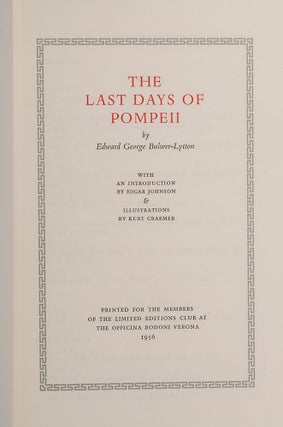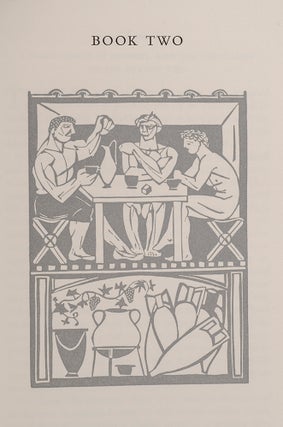Last Days of Pompeii, The
Verona: Printed for the members of The Limited Editions Club at the Officina Bodoni Verona, 1956. Item #03678
"The Pen is Mightier than the Sword"
BULWER-LYTTON, Edward. The Last Days of Pompeii. With an Introduction by Edgar Johnson & Illustrations by Kurt Craemer. Verona: Printed for the members of The Limited Editions Club at the Officina Bodoni, 1956.
Limited to 1,500 copies signed by Giovanni Mardersteig and Kurt Craemer, this being no. 1483.
Royal octavo (10 7/8 x 7 inches; 276 x 178 mm.). 538 pp. Illustrated throughout with designs by Kurt Craemer.
Publisher's full light-gray linen printed with an overall design in dark-gray, spine with red cloth label lettered in gilt, top edge stained yellow, others uncut. A fine copy in the original light-gray dust jacket, spine lettered in black. Housed in the publisher's light-gray slipcase, spine with white label printed in black.
The Last Days of Pompeii is a novel written in 1834. The novel was inspired by the painting The Last Day of Pompeii by the Russian painter Karl Briullov, which Bulwer-Lytton had seen in Milan. The book culminates in the cataclysmic destruction of the city of Pompeii by the eruption of Mount Vesuvius in AD 79. The novel uses its characters to contrast the decadent culture of 1st-century Rome with both older cultures and coming trends. The protagonist, Glaucus, represents the Greeks who have been subordinated by Rome, and his nemesis Arbaces the still older culture of Egypt. Olinthus is the chief representative of the nascent Christian religion, which is presented favorably but not uncritically. The Witch of Vesuvius, though she has no supernatural powers, shows Bulwer-Lytton's interest in the occult – a theme which would emerge in his later writing, particularly The Coming Race.
Edward George Bulwer-Lytton, 1st Baron Lytton (1803-1873), was an English novelist, poet, playwright, and politician. He was immensely popular with the reading public and wrote a stream of bestselling novels which earned him a considerable fortune. He coined the phrases "the great unwashed", "pursuit of the almighty dollar", "the pen is mightier than the sword", "dweller on the threshold", as well as the well-known opening line "It was a dark and stormy night".
Kurt Craemer (1912-1961) was a German artist who studied under Paul Klee.
Limited Editions Club Bibliography, 270.
Price: $180.00

 I have been in the rare and antiquarian book business for over forty years; my family has been in the rare books business since 1876. Rare books are in my blood.
I have been in the rare and antiquarian book business for over forty years; my family has been in the rare books business since 1876. Rare books are in my blood.


